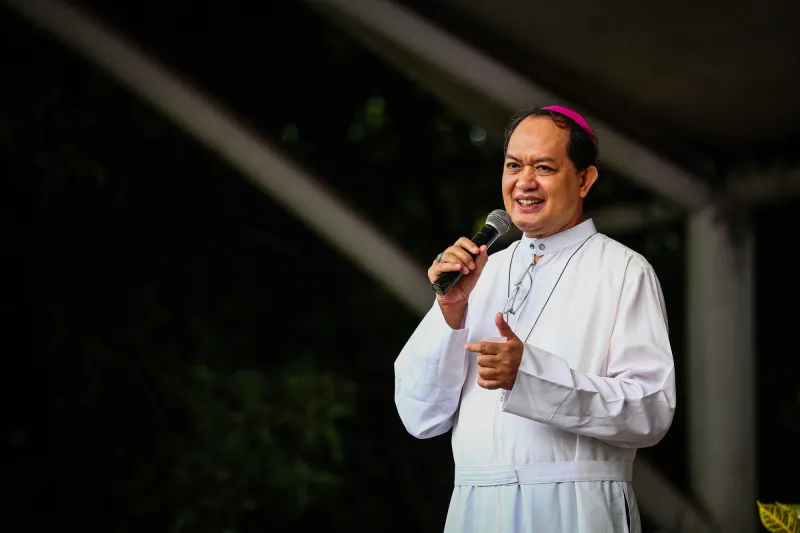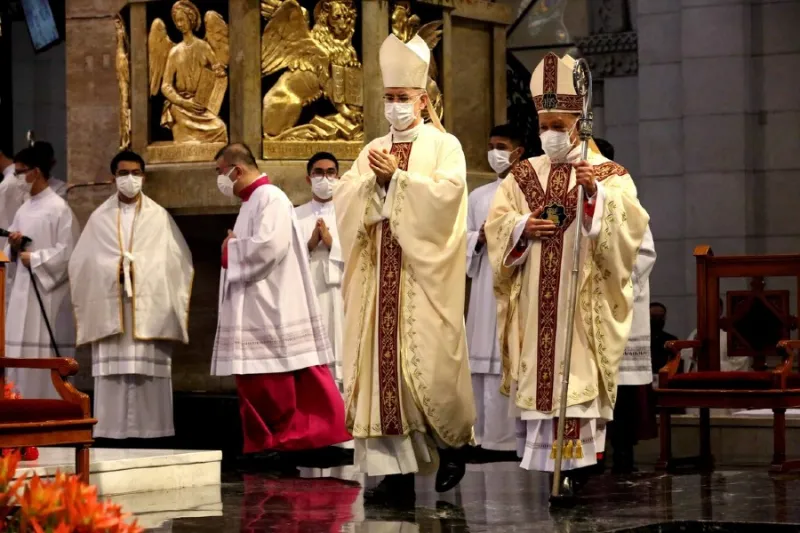 Bishop Pablo Virgilio Siongco David of Kalookan, who was elected president of the Filipino bishops’ conference July 8, speaks in Manila Sept. 1, 2019. Credit: Gerard Carreon for LiCAS.news.
Bishop Pablo Virgilio Siongco David of Kalookan, who was elected president of the Filipino bishops’ conference July 8, speaks in Manila Sept. 1, 2019. Credit: Gerard Carreon for LiCAS.news.
Manila, Philippines, Jul 9, 2021 / 11:31 am (CNA).
The Filipino bishops’ conference on Thursday elected Bishop Pablo Virgilio Siongco David of Kalookan, a staunch critic of the government’s war on drugs, as its president.
The conference elected Bishop David July 8 during its biannual plenary assembly. He had been vice president of the conference since 2017.
Since taking office on June 30, 2016, Philippine President Duterte has carried out a war on drugs that has resulted in the deaths of close to 30,000 suspected drug users and peddlers, according to Human Rights Watch.
Filipino authorities, however, said only 5,903 individuals were killed in police anti-drug operations from July 1, 2016 to September 30, 2020.
Human Rights Watch maintained that the number did not include the deaths of those killed by unidentified gunmen who are believed to operate in cooperation with local police and officials.
Kilusang Mayo Uno, a trade union center, lauded the election of Bishop David, saying that he has “always sided with the poor and the oppressed, particularly the victims of extrajudicial killings.”
“Amidst the chaos brought about by the current health and economic crisis, we were greeted with positive news of Bishop [David]’s election.”
“Just as he continues fighting for human rights, we hope that he also works hand in hand with the workers in advocating for labor rights,” read the group’s statement.
Bong Labog, chairperson of the labor center, said the Filipino labor movement hopes that Bishop David will join in the campaign “for a just and livable national minimum wage, government aid and support for all.”
“As attacks on workers continue to intensify under the Duterte regime, we need more exemplary figures like Bishop [David] who will stand firmly against state repression,” said Labog.
He said Bishop David “can lead the way for the Catholic Church to unite as an institution that will stand up against corruption, criminality and brutality especially on unabated killings.”
Akbayan, a democractic socialist party, described Bishop David as “a person of integrity and has lived his life exemplifying a spirit of service to others.”
“This is a welcome development,” the group said in a statement.
“His long track record in defending human rights, and his staunch and consistent opposition to extrajudicial killings makes him the ideal leader of the [bishops’ conference] to help lead the Church and shepherd its flock back to the path of democracy,” it added.
Bishop David has been the target of the ire of Duterte in the past. He was among several priests and bishops who were accused of sedition by the government. The charges have since been dropped.
The prelate had also received several death threats following his condemnation of the spate of killings in the country.
In 2018, Duterte accused Bishop David of corruption. “You, David, you be quiet. You go on asking for contributions. … Where does the people’s money go?” the president said.
“You don’t have to go to church to pay for these idiots,” said Duterte, referring to bishops who have condemned the wave of drug-related killings in the country.
Bishop David has repeatedly asked the Filipino faithful to pray for Duterte because he is a “very sick man.” He made the statement after the president called saints “fools” and “drunkards.”
Bishop David’s pronouncement angered the president, who said the bishop “might be into drugs.”
Reacting to Duterte’s statement, Bishop David posted on Facebook: “No sir, I’m not into drugs of any sort, whether legal or illegal. Never been.”
“I only help in rehabilitating people addicted to drugs … Thank God I am not even taking any maintenance drugs yet,” the bishop said.
Bishop David, 62, was born in Betis in Pampanga province.
He was ordained a priest of the Archdiocese of San Fernando in 1983, at the age of 24, and was appointed auxiliary bishop of the archdiocese in 2006.
His episcopal consecration took place July 10, 2006, and he was appointed Bishop of Kalookan in 2015.

[…]





